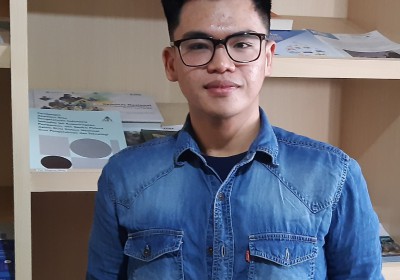Selected Speaker for IDF 2019: Evan Filbert Encourages Scavengers of Galuga Landfill to become Waste Entrepreneurs
November 13, 2019
Evan Filbert
A selected speaker for IDF 2019, Evan Filbert, discussed good practices from his start-up social entrepreneurship in Galuga Village, around the Landfill (TPA) of Galuga, Cibungbulang, Bogor, West Java, through his presentation entitled “Poverty and Waste, is It Crucial? The Role of Social Entrepreneurship in Ending Poverty and Waste Problem”. Evan said that out of 438 Landfills in Indonesia, only 10 percent of them had processed their waste, such as in Surabaya, Makassar, and Balikpapan. According to Evan, for landfills that have yet to manage their waste, the local government can adapt the concept that collaborates three aspects, namely social, economic, and environment, as in the pilot project at Galuga Village.
“Social entrepreneurship as a global phenomenon can surely bring about social changes to find solutions to social issues sustainably and create social value for the people,” explained Evan, a student of the Industrial Engineering major at Pembangunan Nasional Veteran University Jakarta.
In addition to being a selected speaker for IDF 2019, Evan has obtained many achievements in various activities. At the beginning of 2019, Evan took an internship in PT. Indah Kiat Pulp & Paper Tbk. Tangerang and obtained an excellent predicate. In 2018, Evan was included in the Top 20 INDENIC Industrial Engineering Integrated Competition. In his project in Galuga, Evan received funding from the Ministry of Research, Technology, and Higher Education for the Community Empowerment Program in Managing and Distributing Organic and Non-Organic Waste in Improving the Welfare of Villagers of Galuga, Bogor District.
Learning from the practice in Galuga, said Evan, the perspective of waste as a calamity must be changed. A new perspective that should be developed is that waste serves as a resource to increase people’s income.
Altering Scavengers’ Working Pattern in Galuga
Every day, the Galuga Landfill (TPA) receives waste delivery of more than 300 garbage trucks. As quoted from Ayobogor.com, around 475 tons of waste per day are disposed to TPA Galuga.
In his survey, Evan mentions that 30 percent of the population of Galuga Village works as scavengers.
“They only sell waste that they receive and trade them for very cheap. Afterward, the remaining waste with no monetary value will be flattened by heavy machinery to prevent the formation of tall garbage mountains,” explained Evan.
According to Evan, the potential of waste in TPA Galuga is huge and can be turned into a business opportunity to increase income. From this assumption, Evan’s project in Galuga began its development.
“The real measures for program implementation include survey and preparation, mentoring, implementation, monitoring, and evaluation,” continued Evan.
In this program, Evan provides training and assistance in bestowing knowledge to the people of Galuga Village. The training includes waste sorting, organic waste management into fertilizers, inorganic waste management into chopped plastics, and waste bank management, including waste bank organisation, transaction process, reporting, and flow of funds from the waste bank. Evan said that through this program, the people receive expertise in managing waste, making them skillful in marketing products and manage finances.
“The result of this program can grant an amazing prospect for the future, considering how complex and difficult it is to solve poverty and waste volume issues,” stressed Evan.
The Galuga Villager Groups in Evan’s pilot project can manage up to one ton of waste per day. According to Evan, by involving more people and taking place in many landfills, this project will significantly reduce the volume of garbage. From an economic perspective, the gross selling price of plastic waste (before processed) is IDR 3,000 to 5,000 / kilogram. But, after it is processed into crushed plastics, the price reaches IDR 10,000 to 15,000 / kg.
“Good management will surely generate a good economic impact. Through this program, it is expected that the community can independently open business opportunities and unlock new jobs,” continued Evan.
Adapting the Concept in Galuga
To implement social entrepreneurship on waste management, Evan wants the government to initiate five aspects of waste management, from regulatory, institutional, funding, community participation, to the technology used for waste management. To be effective, it is necessary to equip poor and vulnerable communities with local economic development-based entrepreneurship skills and use waste-based local resources as sources for sustainable livelihoods. This requires collaboration with multi-parties, such as the Sanitation and Environmental Office, Local Government, and cadre groups. Business partners are also needed to support program sustainability. Collaboration is essential to develop management cadres to actively persuade the communities to manage waste.
“The key is conducting community assistance and consistent on waste management practices,” emphasised Evan.
The story about Evan’s pilot project in Galuga was presented on the Inclusive Digital Economy Accelerator Space (IDEAS) Imagine Fostering Social Enterprises session in Indonesia Development Forum (IDF) 2019 on July 22. Evan develops Sub-theme 6: Fostering Social Enterprises from the main theme of IDF 2019: Mission Possible: Seizing the Opportunities for Future Work to Drive Inclusive Growth.
Indonesia’s Research Institutions Supporting the Development of the Electric Vehicle Industry
Indonesian Muslim Fashion and Cosmetics IKMs Shine at Dubai World Expo 2020
Govt Steps Up UMKM Transformation Efforts in the Midst of Pandemic Slowdown
Govt Encourages Promotion of IKM Products in Digital Era
Government Begins Developing Maritime Training Center in Makassar
Tweets by IDDevForum
